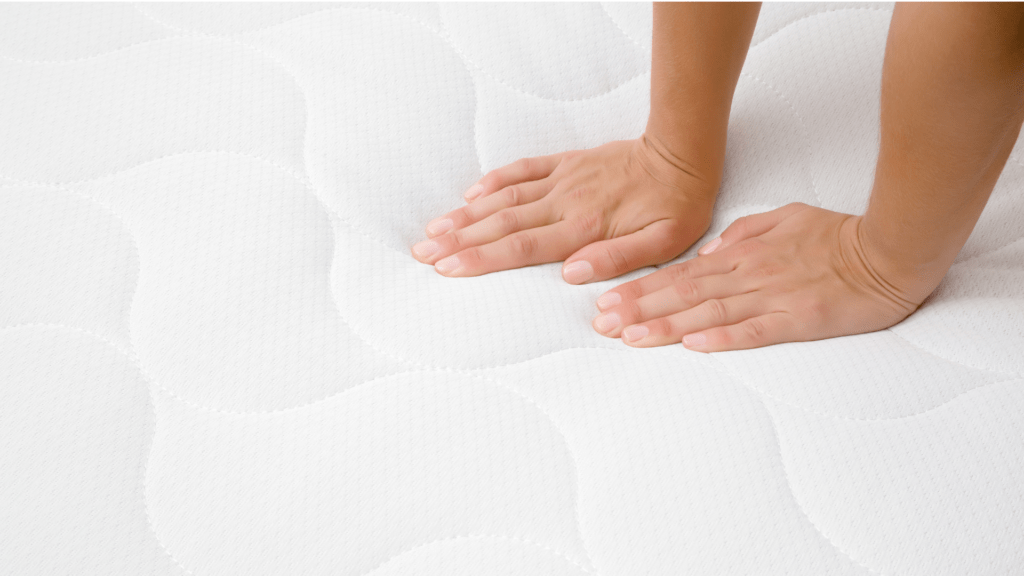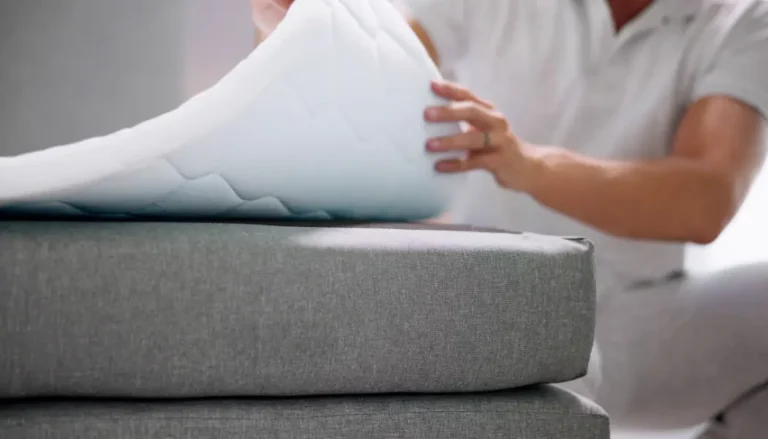When it comes to how to shop for a mattress, many people assume that a higher price tag always means better quality or longer lifespan. But that’s not necessarily true. You don’t need to spend a fortune to find a mattress that’s both comfortable and durable. This guide is here to help you cut through the confusion and make an informed decision.

How to Shop for a Mattress
When you’re in the market for a new mattress, the choices can be overwhelming. Memory foam, latex, hybrid—how do you even start? Let’s break it down.
Memory Foam vs. Latex
These are two popular types of mattresses, each with its pros and cons. Memory foam mattresses are known for their body-conforming properties. They provide excellent support and pressure relief, making them a great choice for people with joint pain or those who prefer a softer feel. On the other hand, latex mattresses are more resilient and have a bouncier feel. They offer good support and are naturally more breathable, which helps with temperature regulation.
Firmness Matters
Whether you prefer a firm or plush mattress, the level of firmness can significantly impact your sleep quality. A memory foam firm mattress is ideal if you need extra support, especially for back pain. Conversely, if you like to sink into your mattress, a softer memory foam might be the way to go.
Mattress Shopping Tips: What to Look For
So, how do you navigate all these options? Here’s a quick guide:
How to Pick the Right Mattress
Consider your sleeping position and personal preferences. If you’re a side sleeper, a softer mattress can relieve pressure on your hips and shoulders. Back and stomach sleepers often benefit from a firmer mattress that supports proper spinal alignment.

How to Choose a Bed and Mattress
When choosing a memory foam mattress, it’s essential to consider the size of your bed frame and the space available in your bedroom. A memory foam mattress works well with most bed frames, but if you have a specific type of frame, like an adjustable or platform bed, ensure the mattress is compatible. Adding a memory foam mattress topper can further enhance your sleep experience, offering benefits like improved comfort and support while helping you experience clean and odorless sleep by reducing allergens and moisture buildup.
What Kind of Mattress Do I Need?
This depends on various factors like your sleep style, any existing health issues, and your budget. Take the time to research different types and test them out if possible.
Bed Buying Guide: How to Buy a Mattress
When buying a mattress, you want to make sure you’re getting good value for your money. Look for features that matter to you, such as warranty terms and return policies. It’s also wise to read reviews and possibly test the mattress before making a purchase. Remember, a good mattress can significantly affect your sleep quality and overall well-being.
Best Time to Buy a Mattress
Timing your mattress purchase can significantly impact the savings you achieve. The best time to buy a mattress is often during major sales events, such as Memorial Day, Labor Day, and Black Friday, when retailers offer substantial discounts. Additionally, shopping in the spring and late summer can help you take advantage of clearance sales as stores make room for new inventory. Keep an eye on these periods to get the best deal on your new mattress.
When to Buy a Mattress: Timing is Everything
If you’re planning to buy a mattress, timing can play a crucial role in getting the best deal.
Best Month to Buy a Mattress
Generally, the best months to buy a mattress are in the spring or late summer. Retailers often have clearance sales to make room for new models, which means you can find significant discounts. Additionally, shopping during these months allows you to avoid the rush of end-of-year sales, ensuring better selection and more personalized service. Keep an eye out for promotions and holiday sales in these periods to maximize your savings.
Best Time of Year to Buy a Mattress
Major holidays like Labor Day, Memorial Day, and Black Friday are great times to look for mattress sales. During these periods, you’ll likely find some of the best deals and promotions. Additionally, shopping in the spring and summer can be beneficial as retailers clear out older models to make way for new inventory. Timing your purchase around these events can help you get the best value for your money.
When Do Mattresses Go on Sale?
Sales often coincide with holiday weekends and the end of each quarter. Retailers try to clear out inventory to make room for new stock, so keep an eye out during these times. Additionally, major events like Labor Day, Memorial Day, and Black Friday are prime opportunities for significant discounts. Monitoring these periods can help you snag a great deal on your new mattress
Worst Time to Buy a Mattress
Avoid buying a mattress right before major holidays or during the peak season for mattress sales unless you have a specific need. Prices can be higher due to the demand and fewer discounts. Additionally, purchasing during the winter months may result in fewer options and less competitive pricing. Plan your purchase around off-peak times to get the best value.
When to Buy a New Mattress
If your mattress is showing signs of wear or no longer supports you properly, it’s time to consider a replacement. Don’t wait until it becomes uncomfortable or causes health issues. Regularly evaluate its condition and remember that most mattresses should be replaced every 7 to 10 years to ensure optimal sleep quality and support.
Best Time to Buy a Mattress
Timing your mattress purchase can make a big difference in your price. The best time to buy a mattress is during major holiday sales such as Memorial Day, Labor Day, and Black Friday when you’ll find the deepest discounts. Additionally, shopping during the spring and late summer months can help you snag clearance deals as retailers make room for new inventory. Keeping an eye on these periods can help you save significantly on your new mattress.
When to Buy a Mattress: Timing is Everything
Many people think that the best time to buy a mattress is whenever they feel it’s right, but timing can make a big difference in cost and value. You don’t need to rush into a purchase; instead, plan it when you can get the best deals. Additionally, taking advantage of end-of-season sales and promotions can help you find high-quality mattresses at lower prices.
Best Month to Buy a Mattress
Spring and late summer are ideal times to shop for a mattress. Retailers often have clearance sales to make room for new models, which means you can snag a great deal. If you’re looking for the best month to buy a mattress, aim for these periods to maximize your savings.
Best Time of Year to Buy a Mattress
Major holidays are a prime opportunity for mattress shopping. Sales events during Labor Day, Memorial Day, and Black Friday often feature significant discounts. These times are when you’re likely to find the best mattress sales and offers. Additionally, the beginning of the year and summer months can also provide great deals as retailers clear out older models. Planning your purchase around these times can help you get the most value for your money.
When Do Mattresses Go on Sale?
Look out for sales that coincide with the end of the financial quarters or holiday weekends. Retailers often run promotions to clear out inventory, making it an excellent time to purchase a new mattress. Additionally, many online retailers and stores offer special deals and discounts during seasonal sales events. Keeping track of these sales can help you find the best prices and get the most value for your money.
Worst Time to Buy a Mattress
Many assume that any time is a good time to buy a mattress, but there are some periods to avoid. For instance, right before major holidays or during peak shopping seasons, prices can be higher due to increased demand and fewer discounts. Additionally, avoiding times when new mattress models are released can help you steer clear of inflated prices and limited options.
When to Buy a New Mattress
If your mattress is starting to show signs of wear or isn’t providing the support you need, it’s time to think about a replacement. Don’t wait until it’s causing discomfort or impacting your sleep quality. Buying a mattress when it’s truly needed will ensure you get a good night’s sleep and prevent further issues. Regularly check for sagging, lumps, or noises that might indicate it’s time for a new mattress.
Mattress Lifespan: How Long Should a Mattress Last?
When considering how to shop for a mattress, understanding its lifespan is crucial. Most mattresses should last between 7 to 10 years, but this can vary based on the type and quality. Memory foam mattresses often last around 8 years, while latex mattresses may exceed 10 years. Regularly assess your mattress for signs of wear and decide if it’s time to replace it to ensure continued comfort and support.

Average Life of a Mattress: What to Expect
A common misconception is that all mattresses have the same lifespan. However, different types of mattresses have varying longevity. Understanding the average life of a mattress can help you make better decisions about when to replace yours.
How Long Do Mattresses Last?
On average, a mattress should last between 7 to 10 years. This lifespan can vary based on factors like the mattress type, how often it’s used, and the quality of materials. Regular maintenance can also affect how long a mattress lasts. When how to shop for a mattress is on your mind, consider both the expected lifespan and the warranty to ensure you’re making a smart investment.
How Long Does a Mattress Last?
The lifespan of a mattress depends on the material. For example, innerspring mattresses typically last around 7 years, while high-quality memory foam and latex mattresses can last up to 10 years or more. Keeping an eye on wear and tear can help you determine when it’s time for a new one. When learning how to shop for a mattress, remember that a longer-lasting mattress often means better overall value, so choose materials and brands with a proven track record.
Memory Foam Mattresses: How Long Do They Last?
Memory foam mattresses typically last between 7 to 10 years, depending on their quality and usage. Higher-density memory foam tends to be more durable and may extend the mattress’s lifespan. Regular maintenance, such as rotating the mattress and using a mattress protector, can also help maximize its longevity. Additionally, choosing a reputable brand can further ensure that you get the most out of your memory foam mattress.
Do Memory Foam Mattresses Wear Out?
Memory foam mattresses are known for their durability, but they do have a lifespan. Over time, the foam can lose its ability to retain its shape and support, especially if it’s not well-maintained. To ensure longevity, follow proper care guidelines, such as using a mattress protector and rotating the mattress regularly. When how to shop for a mattress, consider memory foam’s durability and how it fits your long-term needs.
How Long Does Memory Foam Last?
A good-quality memory foam mattress can last between 8 to 10 years. This depends on factors like the density of the foam and how well it’s cared for. Higher-density memory foam tends to last longer and maintain its shape better. When evaluating your options, keep in mind the expected lifespan of the memory foam to ensure you make a wise investment in line with how to shop for a mattress effectively.

How Long Does a Latex Mattress Last?
Latex mattresses are generally more durable than many other types. They can last between 10 to 12 years. Natural latex tends to have a longer lifespan compared to synthetic latex, due to its resilient nature. When how to shop for a mattress, consider the longevity of latex if you’re looking for a long-term investment. Proper maintenance, such as regular rotation and using a mattress protector, can further extend its lifespan.
Tempurpedic Mattresses: Longevity and Replacement
Tempurpedic mattresses typically last between 8 to 10 years, thanks to their high-quality materials and construction. However, as with any mattress, signs of wear may become evident over time. To maximize longevity, it’s essential to follow the manufacturer’s care instructions, such as rotating the mattress regularly and using a supportive bed frame.
If you notice a decline in comfort or support, or if the mattress shows visible signs of wear, it might be time to consider a replacement. Investing in a Tempurpedic mattress is often worth it for its durability and comfort, but being mindful of its lifespan will help you make the most of your investment.
How Long Do Tempurpedic Mattresses Last?
Tempurpedic mattresses, known for their high quality and advanced materials, typically last between 8 to 10 years. These mattresses are designed to be durable, but over time, they may still show signs of wear. When considering shopping for a mattress, remember that Tempurpedic offers a long-lasting option but be prepared to replace it as it approaches the end of its lifespan to maintain optimal comfort and support.
How Do I Know If My Tempurpedic Mattress Needs Replacing?
If you notice that your Tempurpedic mattress is no longer providing the support it once did, or if you see visible signs of wear, it might be time for a replacement. Pay attention to how it feels and whether it’s affecting your sleep quality. Additionally, if you experience discomfort or pressure points that weren’t an issue before, it could signal that your mattress has reached the end of its useful life. When how to shop for a mattress, keep an eye on these signs to ensure you invest in a replacement before your sleep quality is compromised.
How Often Should You Replace Your Mattress?
Most experts recommend replacing your mattress every 7 to 10 years to ensure you continue to get proper support and comfort. Over time, even high-quality mattresses can lose their effectiveness due to wear and tear. If you experience persistent discomfort, uneven surfaces, or disrupted sleep, it might be time for a new mattress. Regularly evaluating your mattress’s condition can help you decide when it’s time to invest in a replacement for better sleep quality.

Replacing Your Mattress: When Is It Time?
A common belief is that a mattress should be replaced only when it starts to feel uncomfortable. However, there are other factors to consider that can signal it’s time for a new mattress. Regularly assessing your mattress’s condition can help you avoid discomfort and maintain quality sleep. Pay attention to any changes in your sleep patterns, as these could be signs your mattress is no longer providing adequate support.
How Often Should You Replace a Mattress?
Generally, a mattress should be replaced every 7 to 10 years. This timeline can vary depending on the type of mattress and how well it has been maintained. For instance, memory foam and latex mattresses might last longer compared to traditional innerspring models. Regular cleaning and using a mattress protector can also help extend its lifespan.
How Often Should You Change Your Mattress?
If your mattress shows signs of wear such as sagging, lumps, or significant wear and tear, it’s time to consider a replacement. Even if it’s not uncomfortable, a mattress that’s past its prime can impact your sleep quality. Additionally, if you notice an increase in allergies or asthma symptoms, your old mattress might be the culprit.
Mattress Lifespan and Replacement: Balancing Comfort and Durability
Finding the right balance between comfort and durability is key to maximizing your mattress’s lifespan. Regular maintenance, like rotating your mattress, can help prolong its life. However, if your mattress is no longer providing the support you need, it may be time to consider a replacement to maintain optimal sleep quality.
How Often to Replace Mattress
Keep an eye on your mattress’s condition and your comfort. If you start waking up with aches or notice your mattress isn’t as supportive as it used to be, it might be time for a new one. Regularly rotating your mattress can also help extend its lifespan. Consider replacing it if you notice visible sagging or if you’re experiencing allergies, which could be due to accumulated dust and allergens.
How Often Should You Replace Your Mattress
Regularly check for signs of wear and assess your comfort level. If you’re noticing persistent issues or the mattress is affecting your sleep, it’s worth considering an early replacement. Don’t wait until it becomes a major issue; address small problems before they worsen. Additionally, if your mattress is older than the recommended lifespan of 7 to 10 years, it may be time for an upgrade.
Conclusion
To sum it up, how to shop for a mattress, choosing the right mattress, and knowing when to replace it involves understanding several key factors. Timing your purchase, knowing how long different types of mattresses last, and recognizing signs that it’s time for a replacement are all crucial for ensuring you get the best value and comfort.
When shopping for a mattress, consider factors like type, firmness, and timing. Look for sales during key months and holidays to get the best deals. Regularly assess your mattress’s condition and don’t hesitate to replace it if it’s affecting your sleep.
Ready to upgrade your mattress? Use these tips to find the perfect one and enjoy better sleep. Start your search now and ensure you’re investing in a mattress that will provide comfort and support for years to come.



